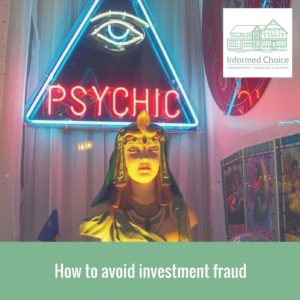 The Financial Conduct Authority (FCA) has launched a national campaign to educate consumers on how to avoid investment fraud.
The Financial Conduct Authority (FCA) has launched a national campaign to educate consumers on how to avoid investment fraud.
They have set up the Scamsmart website, funded using the proceeds of crime, to help investors avoid investment fraud.
Suggestions on website include rejecting cold calls offering investment opportunities.
According to the FCA, the average victim loses around £20,000. The regulator receives nearly 5,000 calls a year from investors about suspected cases of investment fraud.
Here are some ways in which you can avoid investment fraud:
Beware of returns which are too good to be true
A classic warning sign of investment fraud is the offer of astronomical returns on your money.
It’s quite simple; there is an unbreakable link between investment risk and potential returns. If sky-high returns are on offer, the risks must also be sky-high.
Also watch out for straight line returns
Another classic attribute of fraudulent investments is past investment returns which appear to run in a straight line, with little or no volatility.
Cash is the only investment asset class which comes with no volatility, but the returns from cash are also very low.
If an investment opportunity offers a consistent return of say 4-5% per month, it’s probably fraudulent. Just saying.
Do your due diligence
Investment fraudsters tend to operate outside of the regulated UK financial service environment.
To give investment advice to retail investors in the UK, an adviser needs to be authorised and regulated by the Financial Conduct Authority (FCA). Check they appear on the Financial Services Register here.
They also need to hold a valid Statement of Professional Standing (SPS) from a designated professional body, such as the Chartered Insurance Institute (CII) or Institute of Financial Planning (IFP).
Ask to see a copy of their SPS and double-check it is real by calling the professional body named on the certificate.
Avoid esoteric assets
If you stick with cash, fixed interest securities, equities and commercial property, your chances of falling victim to investment fraud are greatly reduced.
Invest in Brazilian teak forests, Mexican golf resorts or gold dust schemes, and you are probably going to join the ranks of investment fraud victims.
It’s a pretty simple choice.
Stay local
If you’re a UK investor, there are very few reasons for ever buying an investment scheme from outside of the UK.
Fraudulent investments schemes are often promoted and operated from overseas locations including Spain, the Caribbean or the Middle East.
Stay local when dealing with investment advisers; you can meet them face-to-face, ensure their office actually exists and benefit from the protection of the Financial Services Compensation Scheme (FSCS) in the event something goes wrong.
Get a second opinion
There is never any harm in getting a second opinion from a professional adviser.
Speak to another Financial Planner, your solicitor or accountant, before parting with your cash, and make sure they think the proposed scheme is legitimate.
Hang up on cold callers
Never, ever invest in a scheme introduced to you by a cold caller.
There is a good chance you are receiving a call from a boiler room operation, designed to get their hands on your money.
If you receive a cold call about an investment scheme, regardless of how convincing it seems, just say no and hang up.
Look out for elderly relatives
Older people are often more vulnerable to investment fraud, so talk to them about the risks and look out for their best interests.
We often hear about elderly people who are bombarded with cold calls or post promoting fraudulent investment schemes.
Spending time with elderly relatives and taking an interest in any approaches from salespeople is a good way to help keep them safe.
Once bitten, twice shy
Victims of investment fraud are targeted on multiple occasions, often because they appear on a ‘sucker list’ which is sold by the first fraudster to other fraudsters, identifying you as an easy target.
If you have ever fallen victim to investment fraud in the past, be especially cautious about it happening to you again in the future.
Consider taking additional steps to protect your identity, such as changing phone numbers (and making these numbers ex-directory).

